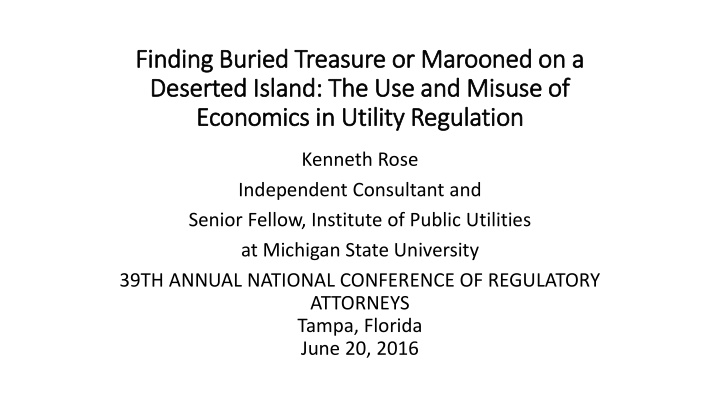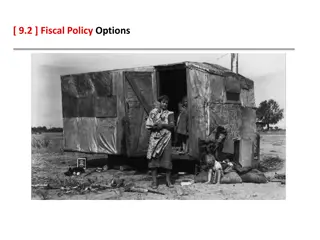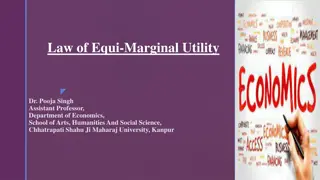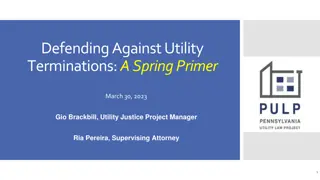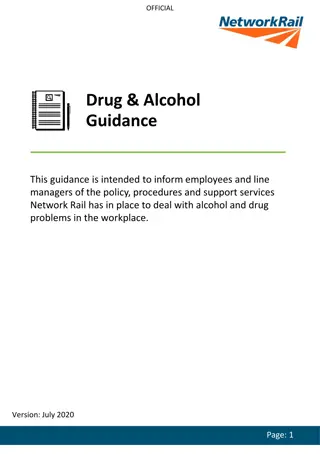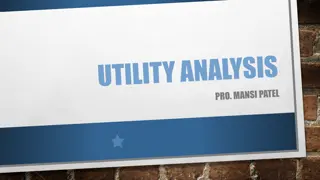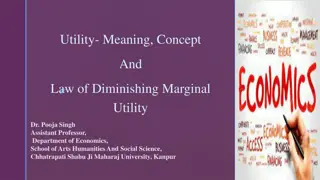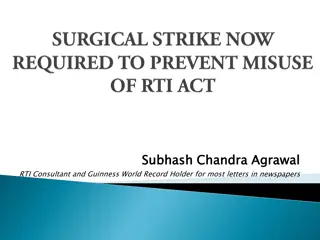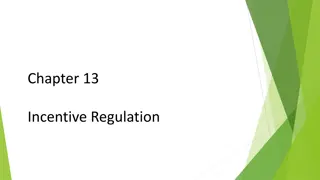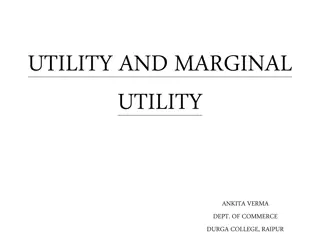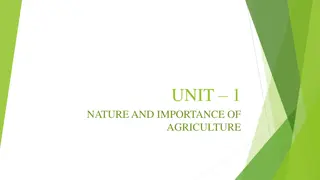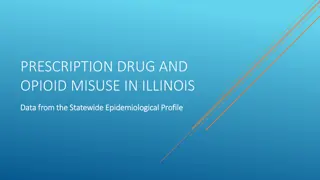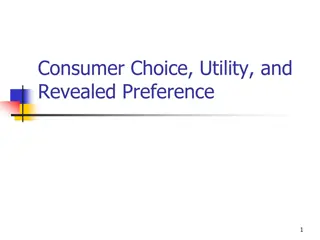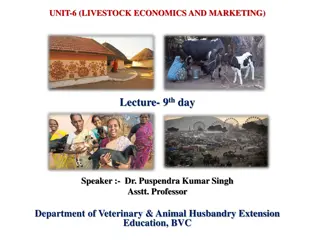Economics in Utility Regulation: The Use and Misuse of Market Concepts
Attorneys and regulators need economic literacy to address market and regulatory issues effectively. Explore the characteristics of perfectly competitive markets, market inefficiencies, and the need for government intervention in certain sectors. Gain insights into RTO capacity markets and the institutionalist views presented by Harry Trebing. Enhance your understanding of efficient market outcomes and the role of government in ensuring the supply of goods and services at optimal costs.
Download Presentation

Please find below an Image/Link to download the presentation.
The content on the website is provided AS IS for your information and personal use only. It may not be sold, licensed, or shared on other websites without obtaining consent from the author.If you encounter any issues during the download, it is possible that the publisher has removed the file from their server.
You are allowed to download the files provided on this website for personal or commercial use, subject to the condition that they are used lawfully. All files are the property of their respective owners.
The content on the website is provided AS IS for your information and personal use only. It may not be sold, licensed, or shared on other websites without obtaining consent from the author.
E N D
Presentation Transcript
Finding Buried Treasure or Marooned on a Finding Buried Treasure or Marooned on a Deserted Island: The Use and Misuse of Deserted Island: The Use and Misuse of Economics in Utility Regulation Economics in Utility Regulation Kenneth Rose Independent Consultant and Senior Fellow, Institute of Public Utilities at Michigan State University 39TH ANNUAL NATIONAL CONFERENCE OF REGULATORY ATTORNEYS Tampa, Florida June 20, 2016
Why Attorneys, and Others in Regulation, Should Know Some Economics States and federal regulators are dealing with market and regulatory issues that requires economic literacy Will cover some terminology and concepts here that may come in handy Also, some of Harry Trebing and the institutionalist views that are still useful today will use RTO capacity markets to illustrate this point Ken Rose, 2016 2
What Characterizes a Market? Perfectly Competitive Markets large number of buyers and sellers free entry and exit product homogeneity perfect information Not So Perfect Markets few suppliers, or one dominate one significant barriers to entry product differentiated imperfect or asymmetric information significant externalities ignored or not fully accounted for no externalities or internalized Ken Rose, 2016 3
Rorschach test for economists: Is this an efficient market outcome, or price gouging? Ken Rose, 2016 4
Harry Trebings First Major Postulate of the Institutionalist Model Harry Trebing laid out five major postulates of the institutionalist model in an 1987 article The first states why government intervention is necessary in his view: industrialized societies give rise to concentrations of power, increased uncertainty, performance failures, uncompensated costs, and adverse distributional effects and in many sectors, markets are not self-correcting and are incapable of assuring an adequate supply of goods and services at least cost There is a real-life example of Prof. Trebing s first postulate in the electricity supply business the development of Regional Transmission Organizations (RTOs) Ken Rose, 2016 5
RTO Evolution RTOs evolved from power pool arrangements between regulated and vertically integrated utilities to very complex organizations RTOs over the last 20 years have become major enterprises with considerable influence that now plays a critical role in the U.S. utility infrastructure The largest RTO by sales volume is PJM Interconnection, which covers a region that includes all or part of 13 states and the District of Columbia with over 61 million people In 2014, PJM produced 837,796 Gigawatt hours of energy and had over $50 billion billings for the year Ken Rose, 2016 6
RTO Evolution (continued) RTOs did not evolve by design or from government fiat, but rather have developed and grown over time taking on increasing responsibility and importance The result has been institutions that were not prescribed by legislation or regulation but now exert a powerful influence with little public input RTOs are overseen by the Federal Energy Regulatory Commission (FERC) and are governed by independent boards and committees of stakeholders that include market participants with strong economic interest in rules and procedures of the RTO However, public input is peripheral, at best Ken Rose, 2016 8
RTO Evolution and Capacity Markets RTOs have grown and adapted to regulatory requirements and other perceived challenges over the years and this has led to considerable complexity This includes multiple market structures that few can or do understand A prime example is RTO capacity markets The argument for creating a capacity markets within the RTO structure was that energy and ancillary services market revenues alone were insufficient to induce an adequate amount of new capacity or to prevent existing capacity from leaving the market Ken Rose, 2016 9
RTO Capacity Markets There has been a heightened sense of urgency as power plants close or are scheduled to close soon The cause of these closures and announcements has been attributed to the continued relatively low electricity energy prices (largely a consequence of relatively low natural gas prices), the impact on energy prices from intermittent power sources (primarily wind), and stricter environmental requirements for existing coal power plants In response, some RTOs have altered or enhanced their capacity markets to improve performance by capacity resources (which capacity markets were intended to solve in the first place) Ken Rose, 2016 10
A summation . . . Redesigned capacity markets, such as PJM s RPM, are generating more revenue for capacity owners, however, it may well stillbe insufficient, from the resource suppliers perspective From the customers perspective, the cost continues to increase, even when energy prices have fallen and remained relatively low since the late 2000s This seems to confirm Prof. Trebing s first postulate, particularly that markets for this type of product are not self-correcting and cannot assure an adequate supply of goods and services at least cost Ken Rose, 2016 11
We should learn from failure, not double down Ken Rose, 2016 12
What reforms are necessary? (continued) In a 1984 essay, Prof. Trebing summarized another institutionalist, Horace M. Gray s take on economic regulation the sharing of economic and political power, noting that Gray argued that regulation involves a sharing of power between public and private authority, but such sharing is inherently unstable because private power will ultimately co-opt public power. This comes about because of government s failure to apply its power . . .. FERC has only used oversight authority as RTOs were developing markets and other pricing mechanisms leading to the problems we have witnessed Ken Rose, 2016 13
True or False? In wholesale energy markets, the price is the same as the marginal cost FALSE Suppliers bid a price, not necessarily their marginal cost. Unit dispatch for the region is based on bid prices submitted by suppliers, not marginal operating cost Suppliers with market power can raise the price above marginal cost Why is this important for regulators to know? Should not assume that because there is a market, that means it is a competitive (Corollary: mitigation by the market monitor does not fix all market power) Ken Rose, 2016 14
True or False? A firm that earns economic profit is able to do so because they can exercise market power and inflate the price FALSE A firm can earn economic profit (defined as profit above a normal profit) without having market power (ability to raise the price significantly above the competitive market price). In a competitive market, economic profit dissipates as other firms enter the market this cannot happen with prohibitive entry barriers Why is this important for regulators to know? Avoid policies that allow a regulated firm to earn economic profit, and assume that your market power provisions with limit it. Ken Rose, 2016 15
True or False? A firm that is not covering all of its fixed costs will certainly go out of business. FALSE As long as a firm can cover variable cost and make some contribution to its fixed costs, it will likely remain in business. However, if the firm cannot cover its variable costs, then it will likely shut down. There s a difference between being mostly dead and all dead (mostly dead is still partly alive wisdom from Miracle Max) Why is this important for regulators to know? Should be skeptical of claims that the regulated firm will fold because it cannot cover all its costs Ken Rose, 2016 16
True or False? When prices are falling, that s proof that the market is working, and there is no market power. FALSE Definitely false even a pure monopolist will lower their price when their costs decrease. Conversely, rising prices do not mean there is market power. Why is this important for regulators to know? Need good analysis to detect market power not soothing bromides that make you think everything is fine. Ken Rose, 2016 17
True or False? There is no substitute for careful analysis and thinking with your brain TRUE! Ken Rose, 2016 18
Status Report on Energy Policy in the U.S. Today State of Energy Policy in the U.S. A Brief Summary Ken Rose, 2016 19
We now have incoherent . . . Regulation, because they are not matched to the industry characteristics Markets, that are also not matched to industry characteristics and because we keep tampering and trying repair them with more markets Environment policy, that is maybe the biggest mess of the three since it is now a hodgepodge of technology subsidies, command-and-control regulations, tax incentives, and mandates that only indirectly impact emissions We have chosen a costly route for solving our problems Ken Rose, 2016 20
This may sum it up the best Gridlock [grid-lok] noun 3. any situation in which nothing can move or proceed in any direction Ken Rose, 2016 21
